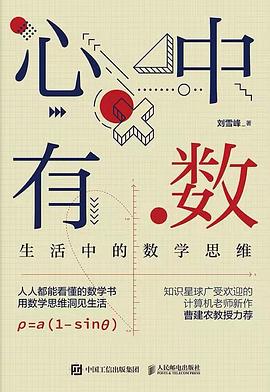WULOLIFE
《心中有数》作者: 刘雪峰 出版社: 人民邮电出版社
《心中有数》作者: 刘雪峰 出版社: 人民邮电出版社
Couldn't load pickup availability
Description
内容简介 · · · · · ·
作为数学类普及读物光荣入选2022年度5月“中国好书”榜单。《心中有数:生活中的数学思维》是一本有趣的数学思维书,书中用生活中的案例与数学公式相结合,来看待当前世界中的各种现象,帮助读者了解数学思维、并将其运用到生活之中。
★
你以为无解的方程组真的无解吗?
维特根斯坦说:“数学是各式各样的证 明技巧。”
如何用数学重新求证我们的人生?
小到电饭锅为什么不会糊底,筷子夹不起来豌豆丁怎么办;大到如何更好地与他人相处,如何选择自己的职业。这些看似与数学无关的问题其实都蕴含着深刻的数学思维。通过理解这些思维,你能的解决方案。
★
你不再会被那些看似“劝退”的数学公式“吓倒”,而是会直接透过这些公式理解它们背后闪耀的理性思维。
如果你是一名对这本书,你可以立刻理解这些公式,它们不再仅是书本上的一面之缘,而会成为烙印在你大脑里的思维方式。
★
勤能补拙的大数定律, 大道至简的稀疏概念,件独立,精益求精的数值解法,中庸之道的最小二乘法……
并在你遇到问题时向你提供更科学的视角,更好的决策和行为。
最终结果是我们不能预见的,但是,这个结果发生的概率是我们可以靠努力达成的。
《心中有数》教你像电脑的处理器一样,快速、深层地剖析事物的“利与弊” 。
★
愿你“心中有数”,行之有方。
作者简介 · · · · · ·
刘雪峰,北京航空航天大学计算机学院副教授,博士生导师。2008年毕业于英国布里斯托大学,获博士学位。知识星球广受欢迎的计算机老师。主要研究方向包括线性代数、信号处理、人工智能等。先后主持多项国家自然科学基金面上项目、参与国家科学基金重点项目。在国内外期刊和国际会议上发表学术论文70多篇。2018年荣获高等学校科学研究优秀成果奖(无线网络系统中的分布式计算理论与方法”),在ISSNIP, WCNC等国教的《小波信号与系统》在学院的课程评教中,以满分成绩荣获全学院第一名。
目录 · · · · · ·
前言思维篇 用理性思维看待世界第1章 平静接受现实,努力改变概率第2章不要高估“解释”而低估“预测”
第3章 三个臭皮匠,未必顶得过诸葛亮第4章 频繁的小确幸与偶尔的大幸福第5章深层剖析“利与弊”
第6章 世界是稀疏的:复杂现象背后的简单规律第7章看似相关,实则独立:条件独立带来的启发第8章 空气净化器与卡尔曼滤波器方法篇解决难题的策略和技巧第9章 什么才是好的设计:找准底层更重要第11章何时冒险:看基础概率第13章 “执两用中”的智慧:最小二乘估计给出的解释第14章 精益求精与步步为营第15章变换的思维:问题不好解决,那就变换事物的形态第16章模拟退火算法:为什么年轻时应该多去闯闯学习篇 如何学习和表达第17章 怎样读书看报才能进步最快第18章好的学习方法论:机器学习模式给我们的启发第19章如何清晰地表达一件事:矩阵的奇异值分解的启发
